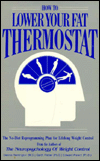 How do you summarize an entire book? Well, I cheated and used their summary:
How do you summarize an entire book? Well, I cheated and used their summary:The authors theorize that each person has a "thermostat" for weight that their body oscillates around. For some its higher, others lower. There are a few ways to lower your fat thermostat.
1. Exercise will lower the set point
2. Decrease the fat in your diet
excess fat in the diet will get stored on the body. (I'd have to argue this one somewhat, because our low-fat diets have gone to extremes; fat is an essential part of the diet.)
3. Decrease your intake of refined carbohydrates
Refined carbohydrates flood the body with a sudden rush of glucose. This triggers insulin to be released to break down the glucose. "In the presence of excess insulin, a disproportionate share of the sugar in the bloodstream is converted to fat and deposited in the fat stores. Excess insulin also seems to inhibit or slow the breakdown of fats for the energy needs of the body. This combination leads to more reliance on sugar as the major fuel source, a more rapid use of the ingested sugars, the need for more frequent eating, the eating of larger volumes of food, and a preference for sugars in the diet. It also leads to an increase in fat stores and the protection of those fat stores." (p 79)
They use a term called "refined carbohydrate unit" which I think today is called a glycemic index, to identify foods that will have this insulin-fat storage affect on the body. Foods with high glycemic indices are potatoes, white rice, white flour, white sugar. See Natalie's video on glycemic index. In my opinion, this is why the Adkins diet works: we're eating too much white flour, white sugar, and potatoes! But the Adkins diet is not sustainable. We need carbohydrates; and veggies, fruits, and whole grains are fine and don't cause weight gain like refined carbohydrates do.
4. Reduce intake of high-calorie density foods
5. Stop drinking calorie-containing fluids or eating in response to thirst
Drink plenty of water.
6. Eat in harmony with the hunger drives of the body
Eat when you're hungry, stop before you're full. It takes time to get in tune with what our bodies are saying, because so many of us have binged/denied ourselves for so long. Our body knows what its doing. Starvation diets trigger a natural survival technique of the body to go into a hibernation mode and store fat. Thus, yo-yo dieters' bodies (or those with very low calorie diets) get stingier and stingier with energy storage and their bodies are more prone to gain weight.
7. Get proper nutrition
If you're deficient in a certain vitamin, even if your body has had its caloric needs met, its still going to be craving food in an attempt to get nourished.



No comments:
Post a Comment